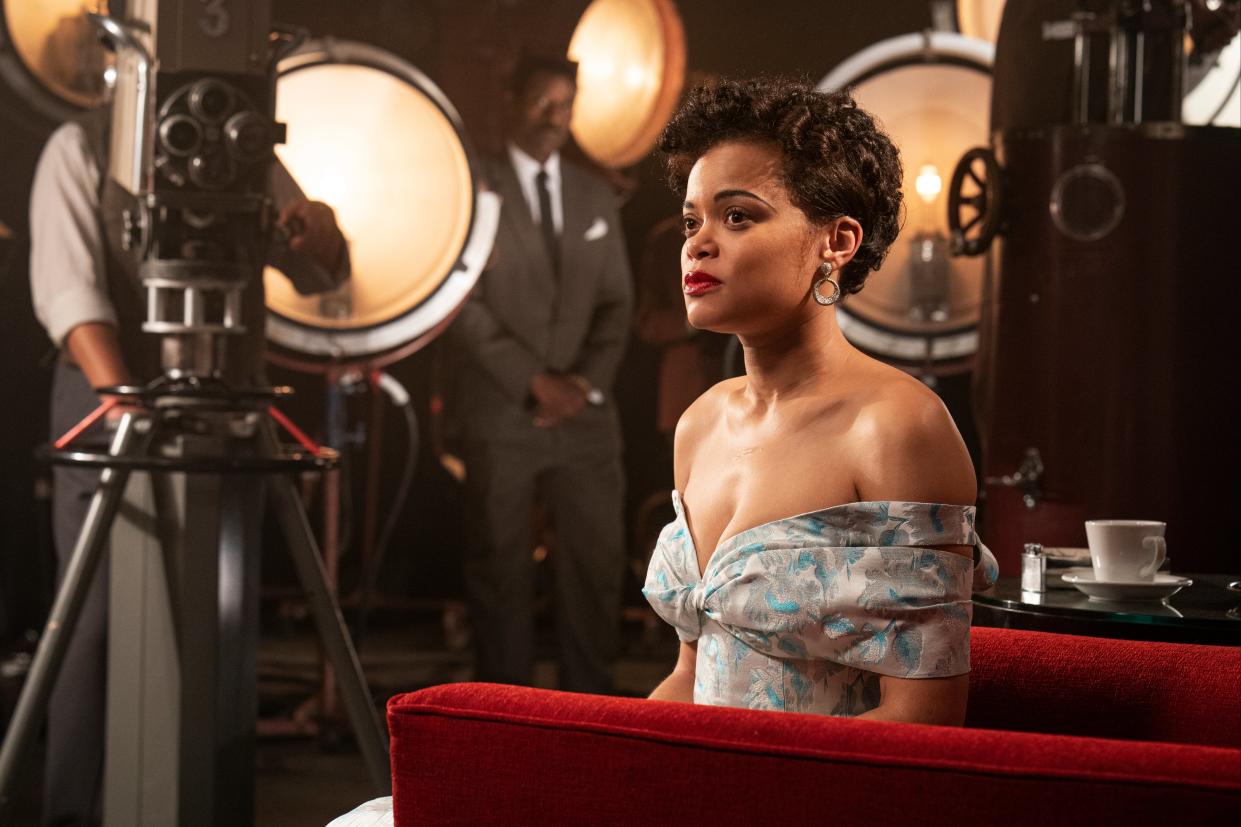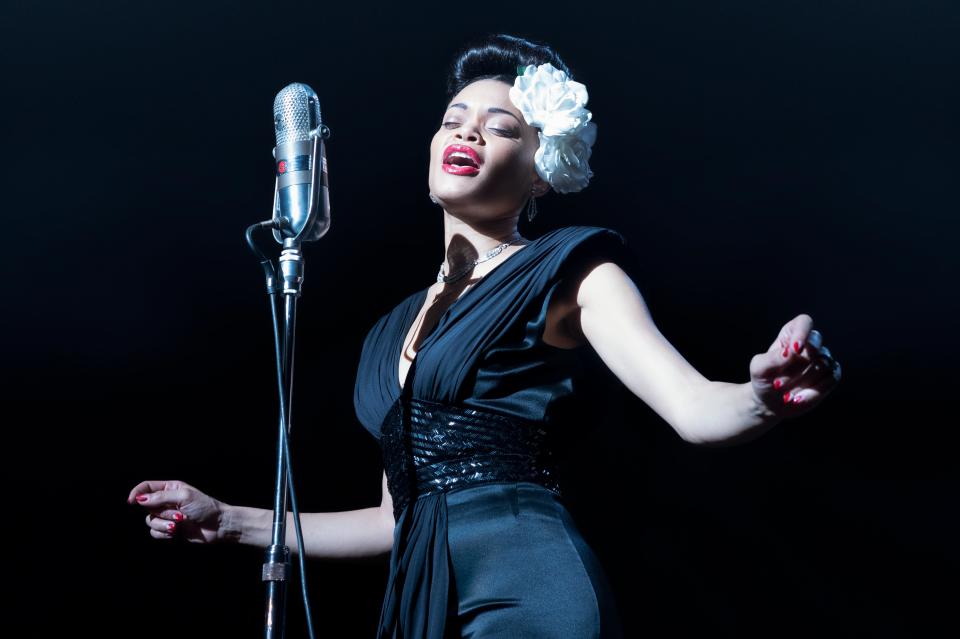Andra Day: Billie Holiday was the great godmother of civil rights - I wanted her legacy to be vindicated

Andra Day needs you to know that she really, really did not want to play Billie Holiday. When the singer and two-time Grammy nominee, best known for her anthemic 2015 track Rise Up, first learned that director Lee Daniels was planning a new biopic of the legendary vocalist, “everything actually just repelled me initially,” she laughs. “Not the story - I love Billie Holiday so much, I actually had no desire to play her because I wanted her role, her legacy, to be done correctly. So I was like, ‘Lee’s the perfect person. Now, he just needs to find the perfect actress, which is not me.’”
With no previous screen acting experience, Day, 36, didn’t see herself as a leading lady. It took a meeting with Daniels, and “reading scripture and devotionals one night” to help the Californian get over a big case of imposter syndrome. “I was actually praying to get out of the role,” she explains over Zoom from her Los Angeles home. “But instead, [the reading] was like ‘Nope, you’re going to do an act of great faith.’ I was like, ‘Aw, crap…’”
Any initial misgivings proved unnecessary: Day is jaw-droppingly good as Holiday, giving the sort of performance that gets under the character’s skin and under the viewer’s too, and has already earned a Golden Globe nomination for Best Actress (an Oscar nod could be on the cards next month too).
Looking back, she thinks that lack of experience helped galvanise her. “I wonder if I could have done it if it wasn’t my first role,” she muses. “People are like, ‘What helped you to do [the role]?’ It was just fear - just the utter, sheer desperation of ‘I have to be great at this, I cannot dishonour her.’” There’s another dash of self-deprecation as she jokes that she worries her acting career will be like “when I bowl that first game and I’m like strike, strike, strike and then it gets worse and worse. I’m the only bowler that goes backwards…”

The United States vs. Billie Holiday, written by Pulitzer winning playwright Suzan-Lori Parks, explores how Strange Fruit, the singer’s haunting protest song which rallied against lynching in the Deep South, put her in the crosshairs of the FBI. Holiday’s heroin addiction also made her a high-profile target for Harry J. Anslinger, the head of the Federal Bureau of Narcotics, in his war on drugs. Anslinger, played in the film by Garrett Hedlund, set up an elaborate sting operation involving Jimmy Fletcher (Moonlight’s Trevante Rhodes), one of few black FBI agents, who ingratiated himself into the star’s inner circle.
It’s a side of Holiday’s life that many will be unfamiliar with. Superfan Day was introduced to the singer’s work when she was an 11-year-old student at performing arts school in San Diego (listening to Strange Fruit for the first time left her “prostrated,” she says) and her stage name is a nod to Holiday’s alias, Lady Day, but she had little idea about how Anslinger and Fletcher had “infiltrate[d] her life, her safety, her heart.” Parks’ script was “revelatory. I hated that I didn’t know that, because I just felt like it is yet another thing that the government was able to successfully keep out of public awareness, but it’s nice to be a part of doing the work of telling these stories now.” That she might be able to reaffirm Holiday as “the great godmother of civil rights” who was “ultimately the first martyr in the war on drugs” was another reason to take the role, she adds.”It was incentivising to me that her legacy would be vindicated.”

At first, Day says, “it was difficult to find funding for the movie,” which speaks volumes about the stories that Hollywood tends to prioritise, but also gave the star plenty of time to “live in [Holiday’s] head space,” revisiting her music and re-reading her autobiography, Lady Sings The Blues. “The movie gave me a valid reason to obsessively stalk Billie Holiday without people looking at me like I was crazy,” she laughs. The film is based on a chapter from Johann Hari’s book Chasing The Scream: The First and Last Days of the War on Drugs, and the journalist shared “tapes of people who he had interviewed [about Holiday] before they passed away.” Outtakes from her recording sessions, too, “were like gems and jewels to me when we were bringing this character to life.”
She even ended up going method, albeit accidentally. “I didn’t realise I was doing it, because it wasn’t a technique I had studied,” she says. “I don’t smoke or drink or curse, but I started smoking cigarettes and drinking alcohol to sort of feel her in my body” - in other words, she did everything a professional singer is advised against. Was she worried about the potential repercussions? “The thought passes your mind, right, because what I do for a living is music?” she says. “But what I worried most about was actually just doing it wrong and not honouring her. I mean… my ENT [doctor] is a little bit stressed right now, but it’ll come, it’ll heal. Every project feels like - if this is the last one, I’ve got to make it great.”

Daniels, her director, has form when it comes to coaxing striking, authentic performances from inexperienced actors, like Gabourey Sidibe, who received an Oscar nomination for her first ever acting role in his 2009 film Precious. “I call it the Lee Daniels pruning process,” Day laughs. “We all have to go through it… you come in with all your stuff, you’ve prepared all this material, then Lee will come and he’ll be like ‘Cut it in half, do less.’ It’s not because you’re terrible, it’s because you breathe that person already.”
The United States vs. Billie Holiday is one of a handful of recent films exploring the stories of civil rights icons - and unpicking FBI involvement in those stories (One Night In Miami and Judas and the Black Messiah, both of which have generated major awards buzz, make compelling companion pieces for Daniels’ film). It’s “definitely promising” to see these narratives play out on screen, Day says. “These stories in particular are ones that have been kept from us intentionally,” she adds. “I always say, it really is hard to continue to push a system of oppression and racial inequity when you know the depth of someone’s struggle and the breadth of their contribution and triumph, you know? So we’ve been intentionally kept in the dark about these stories, so that this system of supremacy could persist.”
She’s keen to stress, though, that she is looking forward to a day when “the idea that the Oscars, or any of these awards shows [...] could be [full of] black or women’s films or LGBTQ films” is no longer “a weird ‘wow…’ It should just be normal. If they’re all great stories, then they deserve a place. I think, hopefully, we’ll begin to see that soon and then that becomes normal, not a sort of groundbreaking idea.”
The United States vs Billie Holiday is available on Sky Cinema from February 27
Read More
Golden Globes nominations 2021 are in! But who will win and who should win?
Billie Holiday documentary: Excavating the past to uncover a dark, dazzling life
The United States Vs Billie Holiday review: a stunning portrayal of a rebel with a cause

 Yahoo Movies
Yahoo Movies 
